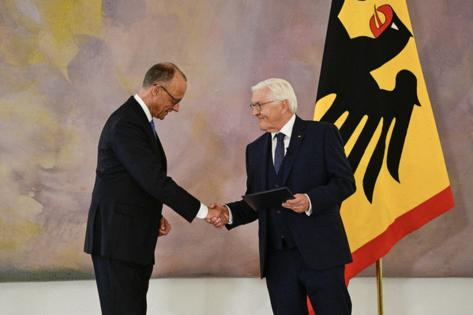Merz confirmed as German chancellor after second parliament vote
Published in News & Features
Friedrich Merz secured parliamentary backing as Germany’s new chancellor on the second attempt, paving the way for the conservative leader to take charge of Europe’s biggest economy but with considerably diminished authority.
In a repeat ballot on Tuesday, arranged after several hours of frantic consultations with constitutional experts, Merz secured 325 votes, more than the required 316 out of 630 lawmakers. He had managed only 310 in an initial tally, even though the coalition partners have 328 Bundestag seats between them.
Lawmakers were left stunned earlier in the day when Merz fell short of a majority in the secret Bundestag ballot that was meant to rubber stamp him as the head of a ruling coalition of his center-right CDU/CSU bloc and the center-left Social Democrats.
It was the first time since World War II that an incoming chancellor failed to secure enough support on the first attempt, delaying Merz from taking over from outgoing SPD Chancellor Olaf Scholz and pitching the country into uncharted territory.
Given the votes are secret, the identities of those who didn’t back him may never be known. Conspiracy theories were already swirling about who might have been responsible and what their motives were.
After his confirmation, Merz is due to be formally appointed by President Frank-Walter Steinmeier and then sworn in by the Bundestag speaker before a handover with Scholz and a first meeting of his new Cabinet.
He’s planning his first trip abroad on Wednesday — to Paris for talks with French President Emmanuel Macron and on to Warsaw to meet Polish counterpart Donald Tusk.
He’ll be keen to quickly put Tuesday’s debacle behind him and get down to work but the shock reverse in parliament represents a huge embarrassment for the 69-year-old, already suffering from low approval ratings, and stoked concerns that his ability to steer government business will be compromised.
Merz is taking charge at a critical moment for Germany. The economy is stagnating after two years of recession, Russia’s war on Ukraine is still raging to the east and support for the far-right Alternative for Germany is strengthening, especially in the former communist eastern regions.
The anti-immigrant party, which was formally classified as right-wing extremist last week by the domestic security service, has overtaken Merz’s bloc in some polls and is now the main opposition force in the Bundestag.
AfD lawmakers celebrated Merz’s stumble, with co-leader Alice Weidel saying in a post on social media that “this demonstrates what a weak foundation” his coalition was built on.
In a subsequent TV interview, Weidel said her party, which finished second in the Feb. 23 national ballot, is ready to join a coalition government.
“We can only demand that common sense prevails, Mr. Merz withdraws and the path is opened for a fresh election,” she added.
“We are living in times of profound change, of great upheaval and great uncertainty,” Merz said Monday at a signing ceremony for the coalition agreement. “Large parts of Europe are waiting for us to play a strong role again in the success of the European project.”
On the plus side, his government is empowered to immediately ramp up much-needed investment in the country’s highways, rail network and bridges after the conservatives and the Social Democrats partnered with the Greens in March to create a €500 billion ($567 billion) investment fund for infrastructure.
They also pushed through changes to Germany’s constitutional borrowing restrictions that effectively exempt defense spending, paving the way for a sweeping overhaul of the armed forces after years of underinvestment.
Merz’s confirmation as chancellor fulfills a decades-long ambition. He interrupted his political career between 2009 and 2021 after clashing with Merkel — who was in the Bundestag on Tuesday — and failed in two attempts to win the CDU leadership on his return before finally succeeding in late 2021.
©2025 Bloomberg L.P. Visit bloomberg.com. Distributed by Tribune Content Agency, LLC.







Comments